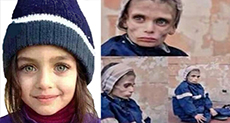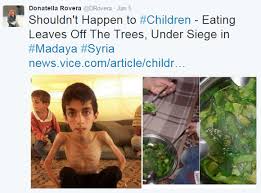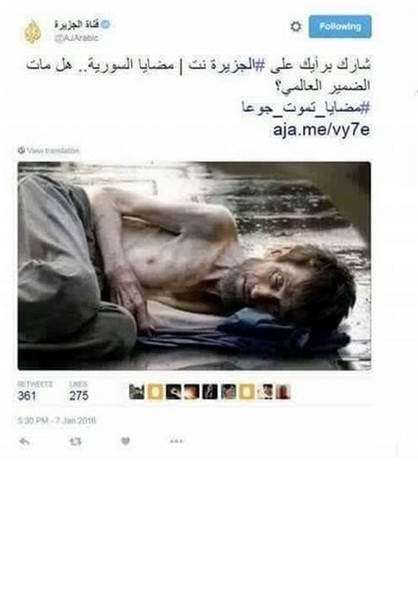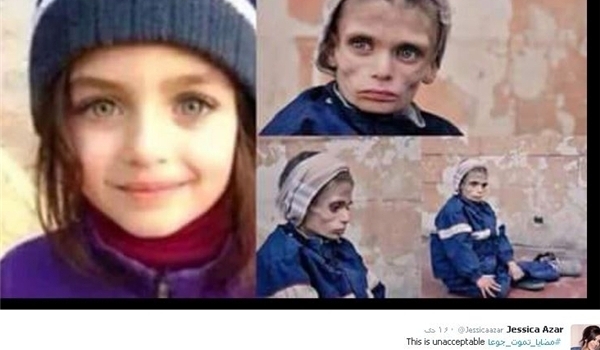
Madaya...The Traded Humanity

By: Darko Lazar
The mainstream media often has a very specific idea of what constitutes news, priding itself on journalistic integrity and discrediting alternative media as amateurish antics not worthy of an audience.
The conflict in Syria has challenged this narrative time and time again.
There has never been a news item out of Syria during the course of the past five years, where turning to one news source would suffice for getting the whole story.
But every so often manipulation of the facts by the western media and governments, stoops to new lows.
Earlier this month the eyes of the world focused on yet another previously unknown town in Syria - Madaya.
Reports of dozens of deaths from starvation, citing so-called monitoring groups and ‘local doctors', in the town surrounded by the Syrian army began circulating the airwaves.
Graphic images of emaciated children dominated the global headlines for days.
Soon after the UN Secretary-General Ban Ki-Moon, was on another condemnation spree.
"The use of starvation as a weapon of war is a war crime," the UN chief warned on January 14.
But all this talk of starvation has very little to do with humanity and even less to do with the truth.
The Al Qaeda offshoots of Ahrar al-Sham and the Nusra Front, which overran Madaya, are also besieging and starving the two towns of Fua and Kufraya in Syria's northwestern Idlib province.
Damascus-based journalist Alaa Ibrahim, who visited the outskirts of Madaya and covered the arrival of the UN humanitarian convoy earlier this week, says that the plight of the town's residents is being misused for propaganda purposes.
"While there is genuine suffering in Madaya, I think many media outlets have been distorting facts, while completely ignoring the plight of the people besieged in Fua, Kufraya and Deir Azor," Ibrahim said.
Another story being ignored is that of the militants inside Madaya stealing the aid entering the town and selling it at high prices.
In videos which surfaced online, the residents of Madaya blamed the militants and not the Syrian government, for their hardships.
"The rebels are trading in people's blood. They are the ones taking all the rice then selling it for 80-90 notes...cigarettes for 5,000 lira, a chocolate bar for 5,000 lira.
And they butchered our children! Burned our trees! They caused all this when aid arrived they stole it and are selling it at high prices", an elderly resident of Madaya said.
But these voices will not be heard in the mainstream media.
Speaking to reporters in New York, Syria's Permanent Representative to the Unite Nations, Dr. Bashar Ja'afari explained why the Syrian people are suffering.
"The reality of the so-called besieged, hard to reach areas is that some of those areas are controlled by terrorist groups who are using civilians as human shields, and other areas are be-sieged from the terrorist groups who are preventing the delivery of humanitarian assistance," Dr. Ja'afari said.
In short the militants and their global allies are holding Syrians hostage, starving them and using the emaciated bodies as propaganda.
The problem however, was that there seemed to be a shortage of people starving in Madaya.
So the media turned to images of emaciated people elsewhere.

BBC's Jim Muir posted a video of a boy, claiming he was starving in Madaya. But the original video posted on YouTube is of boy from the Yarmouk refugee camp on the outskirt of Damascus taken in 2013.

The image of this boy was published by Vice News and Amnesty International's Senior Crisis Advisor, Donatella Rovera. It too is not from Madaya as claimed. It was first posted online in 2013.

This picture which Qatar's Al Jazeera claimed was of a starving man in Madaya was not even taken in Syria. The picture depicts a random homeless man taken in 2009.

This little girl's face was used for propaganda purposes before after supporters of militant groups operating in Syria, stole her picture from Facebook.
This time Saudi Arabia's Al Arabiya, claimed she was starving in Madaya.
But Marianna Mazeh is not even Syrian, she is Lebanese.
Appearing on Lebanese television channels shortly after her picture began circulating online, Marianna told reporters, "I live in Tayr Filsey, not Madaya, and I am fine."
The timing of the Madaya story is also important.
It comes in the lead up to a new round of negotiations between Syria's warring sides slated for later this month in Geneva.
The media's coverage and condemnation by western governments - which at times drew comparisons between Madaya and atrocities committed during WW2 - serve to ‘de-fame' the Syrian government and undermine its role in the political process.
"Madaya will definitely be used as a bargaining chip in future negotiations," said Ibrahim.
He thinks, "This is an ongoing international duel between the Syrian government and its allies and those who support the militants. Because if you notice the western media is also accusing Lebanon's Hezbollah of being responsible for Madaya in the hope of discrediting Damascus' allies."
It is no secret that the people in Syria are suffering.
But the false humanitarianism of western media and officials is part of a much broader agenda.
If the west and their regional allies, along with their media apparatus really did care about the plight of civilians in the Middle East, they would pressure Riyadh to end its siege of the entire Yemeni nation, where a brutal Saudi bombing campaign has claimed the lives of thousands and from where images of mutilated and starving children rarely appear on air.
If the west and its media really did care about civilians in the Middle East they would end their support for militant groups in Syria, where the conflict has killed over 250,000 people, creating the worst refugee crisis since the Second World War.
Source: al-Ahed news



